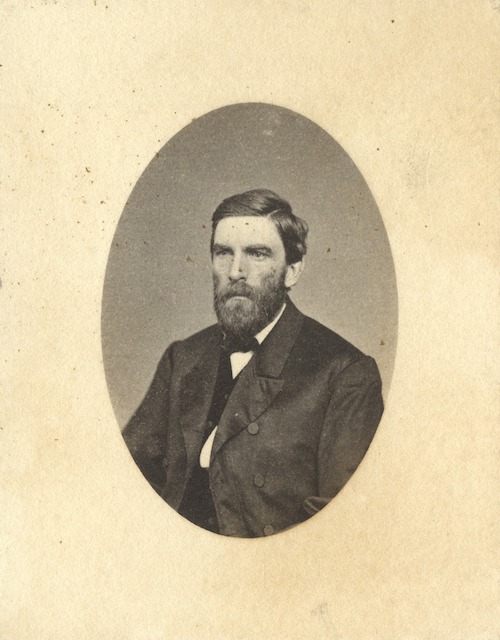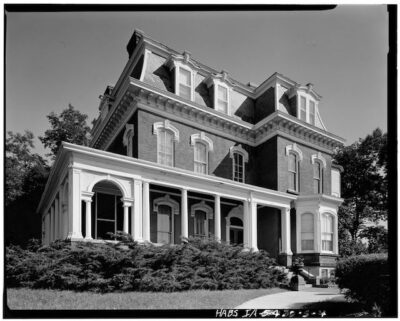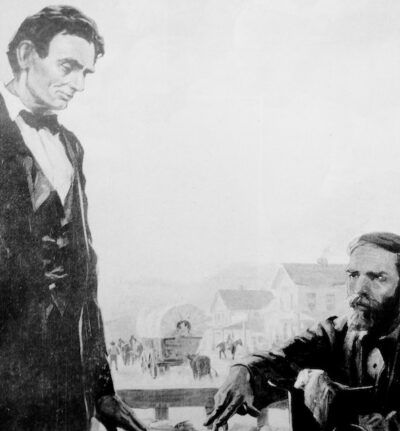
Grenville Dodge moved west to Illinois following graduation from Norwich University. He was passionate about building a transcontinental railroad. Photo courtesy of U.S. National Archives
March/April 2023 (Volume 15, Issue 2)
(Publisher’s note: Our two-part series sums up Grenville Dodge’s adventurous life as “Iowa’s greatest soldier and the world’s greatest railroad builder.” Part one is an overview of his careers in the military, politics and railroad industry. Part two, to be published in the May/June issue of Iowa History Journal, examines his role in the development of military intelligence.)
By Timothy Walch
Grenville Dodge was hardly expected to be a great leader. As a young man, he was described as a short, slight fellow with stooped shoulders and a nervous, impulsive disposition. “I had no reason to anticipate for him much higher distinction,” noted George Miller of the Omaha Herald.
These initial impressions were deceiving, however. Between 1860 and his death in 1916, Grenville Mellen Dodge lived a life of extraordinary adventure. He was an explorer and a hunter, a farmer and a shopkeeper, a soldier and a congressman. He cheated death during war and died a wealthy man.
His lifelong passion was the great iron road — building a rail system across the western half of the United States. It was this “small, very ordinary man” who was the driving force behind the transatlantic railroad. No less than Theodore Roosevelt said that he would rather have had the life experiences of Grenville Dodge than be President of the United States!
Dodge was born April 12, 1831, in Danvers, Mass., the son Sylvanus and Julia Dodge. His was a modest, middle-class family and young Grenville was sent off to work as soon as he reached his teen years. He had every expectation that he would become a farmer or shopkeeper.
While working on a local farm, however, Dodge met Frederick Lander, a civil engineer, who recognized that Dodge was capable of more than farming or shopkeeping. Lander sent Dodge to Durham Academy in New Hampshire and later to Norwich University in Vermont, where he became an engineer.
With his education complete, young Grenville went west to Chicago, Ill., to begin what would be an extraordinary career in planning, building and operating the railroads that would bind the nation. Like many young ambitious men, Dodge started at the bottom as a surveyor and ax man on the Rock Island Railroad. He worked hard and embraced the rugged life. “I can work with my shirtsleeve rolled up and my collar turned down,” he boasted, “and not get blistered.”
But Dodge was ambitious and quickly sought better opportunities. In 1852, he worked for the noted railroad engineer Peter Dey and together they planned the expansion of rail service across Iowa. Dey and Dodge were the force behind the Mississippi and Missouri Railroad Company, and they wasted no time.
Rail service crossed the Mississippi River from Rock Island to Davenport on May 17, 1853, and reached Iowa City by May 26. Dey and Dodge pushed on at an extraordinary pace and eventually reached the Missouri River in 1867 following the American Civil War. It was reported that “Dodge’s men, the first engineers to reach Council Bluffs, were given new clothes and honored at a ball.”

Grenville Dodge spent the last decade of his life writing his memoirs and preserving his papers in this mansion in Council Bluffs. Today, it is the Historic General Dodge House. Photo courtesy of the Library of Congress
Council Bluffs would eventually become home for Dodge, but he did not stay for long. Investors urged Dey and Dodge to cross the Missouri River and push rail service through the Nebraska Territory. It was a goal that presented a unique set of challenges, not the least were the numerous and sometimes hostile tribes of native peoples.
Dodge worked tirelessly to explore and survey the best route across the territory. “After further exploration and numerous discussions with travelers,” wrote historian Stanley Hirschon, “he drew maps showing the best paths from Council Bluffs to Utah, California, and Oregon and indicating where travelers might rest, ford streams, and obtain wood and water.” Dodge pointed the way for the first transcontinental railroad that would connect the existing rail networks in the East at Council Bluffs with the Pacific Coast at San Francisco Bay.
But Dodge lacked funding and political support. He continued to seek both during the 1850s and looked for ways to build a personal fortune. He also settled down and married Ruth Anne Brown, another New England transplant to the Midwest. As the decade was ending, Dodge was a man on the make.

At a chance meeting in 1859 in Council Bluffs, Grenville Dodge shared his plans for the transcontinental railroad with a railroad lawyer named Abraham Lincoln. Photo courtesy of the Danvers Library in Massachusetts
It was a chance meeting with an Illinois attorney that would change Dodge’s life forever. In August of 1859, Abraham Lincoln visited Council Bluffs to evaluate some property. While there, Lincoln met with Dodge and asked about his plans to build a rail service across Nebraska and the West. The conversation lasted more than two hours and made quite an impression on Dodge. Indeed, with Lincoln’s election as president, Dodge saw the way forward.
But the railroad project would have to wait; Lincoln and Dodge would be preoccupied with saving the Union. With the secession of the southern states, the nation was engaged in the Civil War by the summer of 1861. Dodge was quick to join the fight and accepted an appointment as a colonel of the 4th Iowa Infantry Regiment. He would do all that he could to help “Father Abraham.”
TO READ THE ENTIRE STORY AND OTHER FASCINATING STORIES ABOUT IOWA HISTORY, subscribe to Iowa History Journal.
